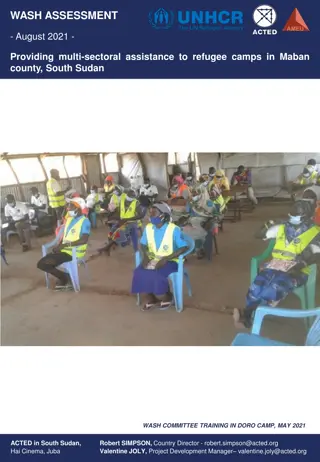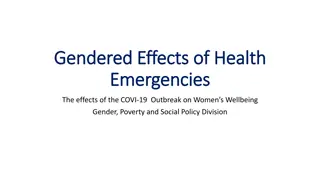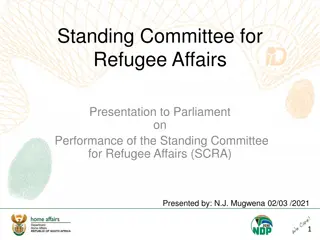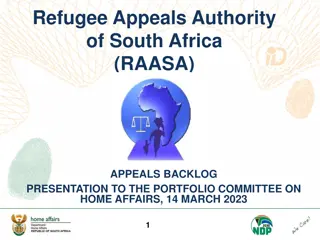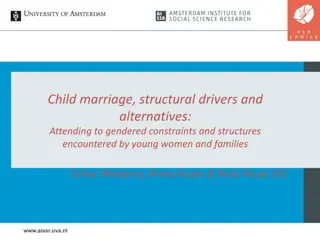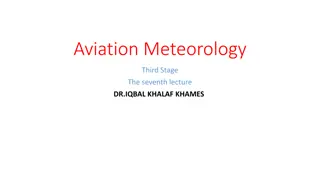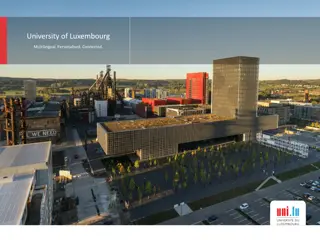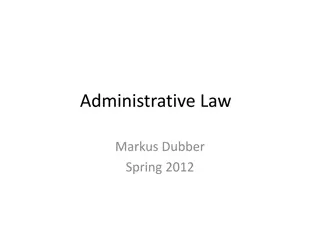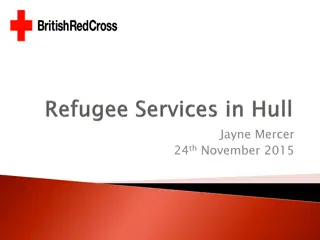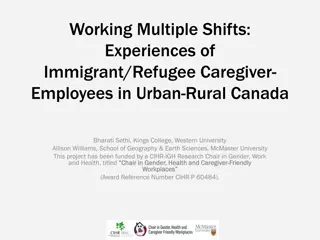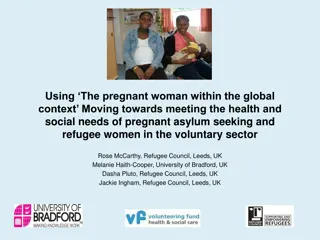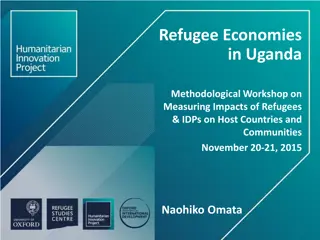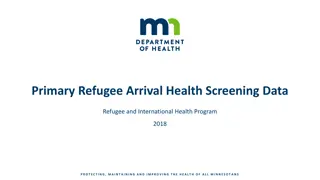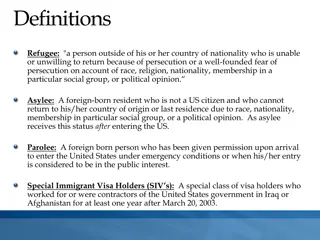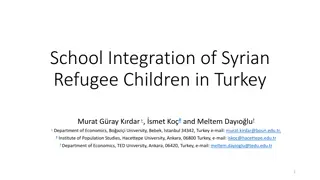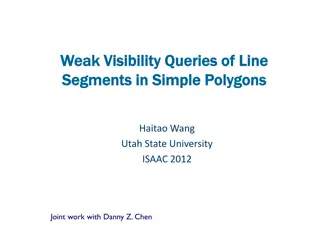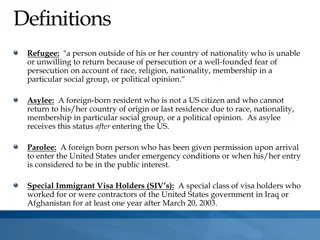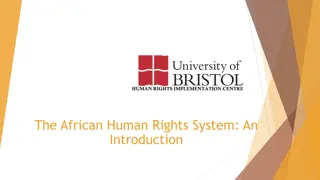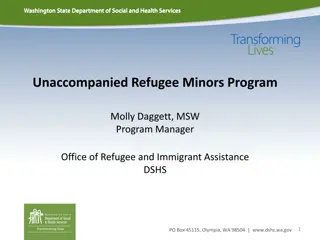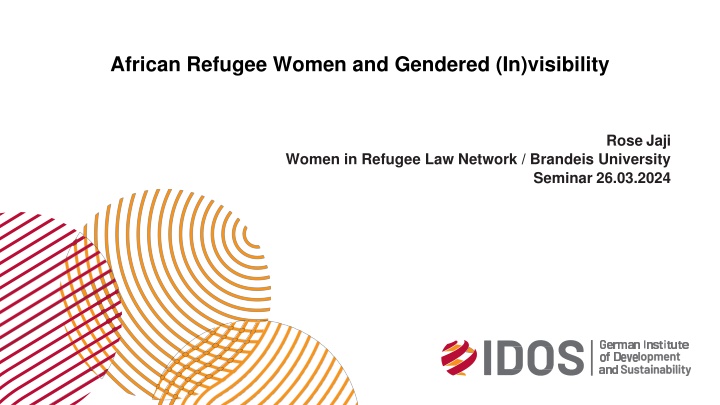
African Refugee Women: Gendered Visibility and Cultural Agency
Explore the intricate interplay of gender, culture, and agency among African refugee women, shedding light on the diverse roles and identities they embody within their specific cultural contexts. Delve into the historical and contemporary narratives of African women in forced displacement, challenging gender binaries and essentialist views to unveil the multidimensional experiences of women navigating displacement and adversity.
Download Presentation

Please find below an Image/Link to download the presentation.
The content on the website is provided AS IS for your information and personal use only. It may not be sold, licensed, or shared on other websites without obtaining consent from the author. If you encounter any issues during the download, it is possible that the publisher has removed the file from their server.
You are allowed to download the files provided on this website for personal or commercial use, subject to the condition that they are used lawfully. All files are the property of their respective owners.
The content on the website is provided AS IS for your information and personal use only. It may not be sold, licensed, or shared on other websites without obtaining consent from the author.
E N D
Presentation Transcript
African Refugee Women and Gendered (In)visibility Rose Jaji Women in Refugee Law Network / Brandeis University Seminar 26.03.2024
Gender and Cultural Heterogeneity in Africa Gender: a social construct which is not necessarily aligned with biology: https://meltingpod.podigee.io/38-rosejaji The binary understanding of gender, gender reductionism, and homogenization of women s social status. The need to situate gender within specific cultural contexts. -gender fluidity in various African cultures, e.g., through religion and kinship structure 1. cross-gender proxies in kinship structure: the Shona in Zimbabwe (Jaji forthcoming) 2. male daughters and female husbands: the Igbo in Nigeria (Amadiume 1987) 3. women choose their sexual partners and spouses: the Wodaabe in West Africa (Boesen 2010) 4. women control the economy, the law, spirituality and the family: the Bisago on the island of Orango, Guinea Bissau https://www.youtube.com/watch?v=Z8uANLdARj8 2 German Institute of Development and Sustainability
Women, History and Political Agency Women and politics in precolonial and colonial Africa -the Queen Mother among the Ashanti of Ghana (B d jo 1998; Lebeuf 1971) -Queens Sheba, Gud t, and M sob W rq in Ethiopia (Andersen 2000) -female chiefs among the Mende of Sierra Leone (Hoffer 1972) - Queen Nzinga Mbandi of Ndongo and Matamba in Angola (Heywood 2017) -Mbuya Nehanda in Zimbabwe: intertwinement of religious and political leadership (Nhongo- Simbanegavi 2000) -women as perpetrators of cultural violence in Zimbabwe -women as political activists at risk of arrest by repressive regimes around Africa 3 German Institute of Development and Sustainability
Gender and Forced Displacement Why do women become homogeneous in forced displacement? -a gendered understanding of violence deriving from: 1. the cultural construction of masculinity and femininity 2. gender roles and division of labor (men as fighters and women as peaceful) -gender binary: men as perpetrators and women as victims of violence: 1. focus on the violences of men (Myrttinen, Khattab and Naujoks 2017) 2. feminization and infantilization of vulnerability: womenandchildren (Enloe 1992) 4 German Institute of Development and Sustainability
Essentialism and Gendered Visibility Visibility without agency mostly represented by African refugee women -Jaji (2021b): the essence of refugeeness symbolized by: 1. multiple victimhoods 2. material deprivation 3. vulnerable femininity 4. desperate motherhood Visibility with criminalized agency for refugee men: -Jaji (2021a): incredulity towards men s victimhood and flight 1. criminals 2. terrorists 5 German Institute of Development and Sustainability
Gendered Invisibilities Invisibility of women as political activists, leaders in political parties and in national peacebuilding Invisibility of women s role in cultural violence in countries prone to political violence -femininity and cultural violence: https://www.youtube.com/watch?v=OljERTx1xnY Invisibility of refugee men s vulnerability, e.g. to SGBV (Christian 2011; Chynoweth et al 2017; Solangon and Patel 2012; Thulin et al 2022) Invisibility of men in peace-building at community level and of women at state level Both women and men participate in politics and repressive regimes target both for persecution and violence The need to critique the stereotypical depiction of women as people who lack political agency and power and the invisibility of men s victimhood 6 German Institute of Development and Sustainability
Gender, Flight, and Mediation by Other Variables Age: young people vs. the elderly Class: how and where to (resources) Disability: (physical challenges) Marital status: (joint decisions and family responsibilities) -e.g., motherhood and balancing social and economic obligations Gendered experience as an outcome of political affiliation and networks -the absence of intra-gender solidarity between women in different political parties 7 German Institute of Development and Sustainability
Conclusion The need to understand refugee women s cultural and political backgrounds and self-representation -evidence-based approaches to understanding gender and and forced displacement The nuances and critique of the binary division of violent and peacebuilding labor -departure from discourses that pathologize African women and deny them political agency: acknowledge cultures and political systems where women s social status is not solely determined by gender - acknowledgment of men s vulnerability: the danger of societies where men s trauma is neglected The need to consider the implications of the paradox of depoliticizing an inherently political population: refugee women being denied political agency Q: Who were the refugee women before they fled their countries? 8 German Institute of Development and Sustainability
Contact German Institute of Development and Sustainability (IDOS) Tulpenfeld 6 53113 Bonn Deutschland Telefon +49 228 94 927-0 Telefax +49 228 94 927-130 presse@idos-research.de www.idos-research.de


